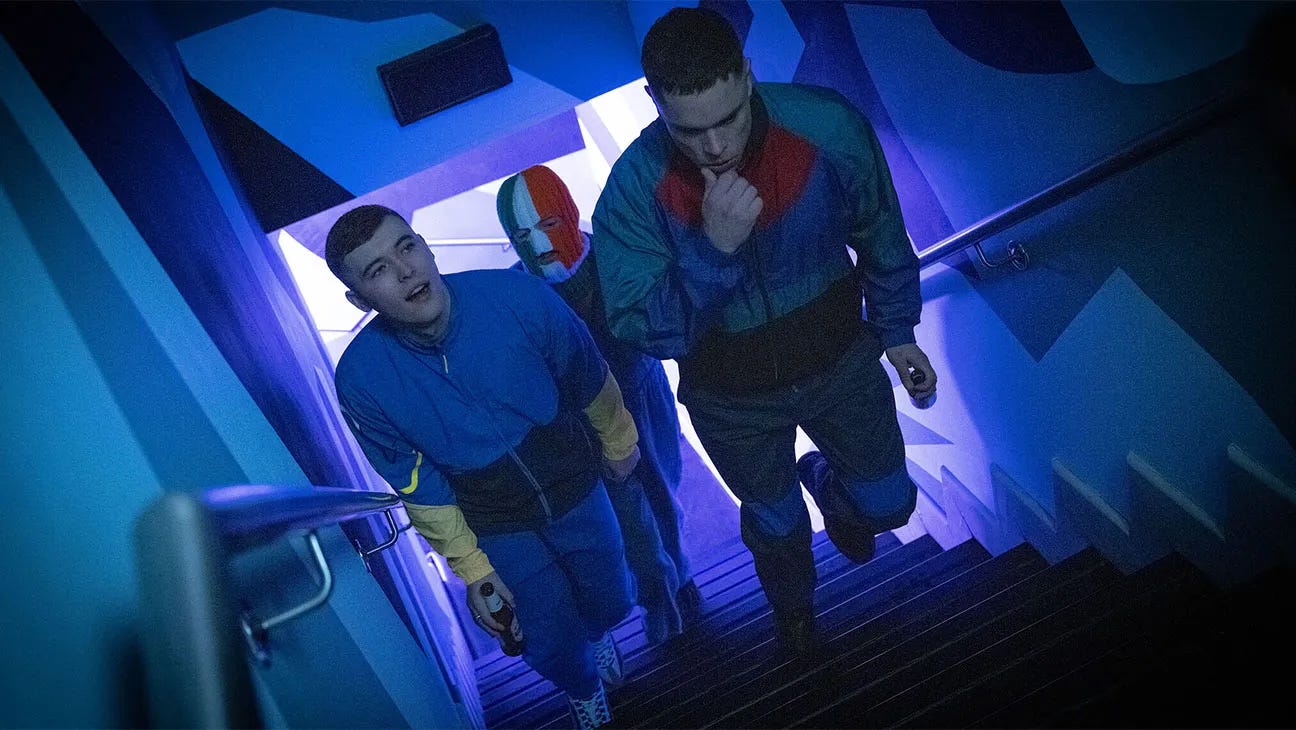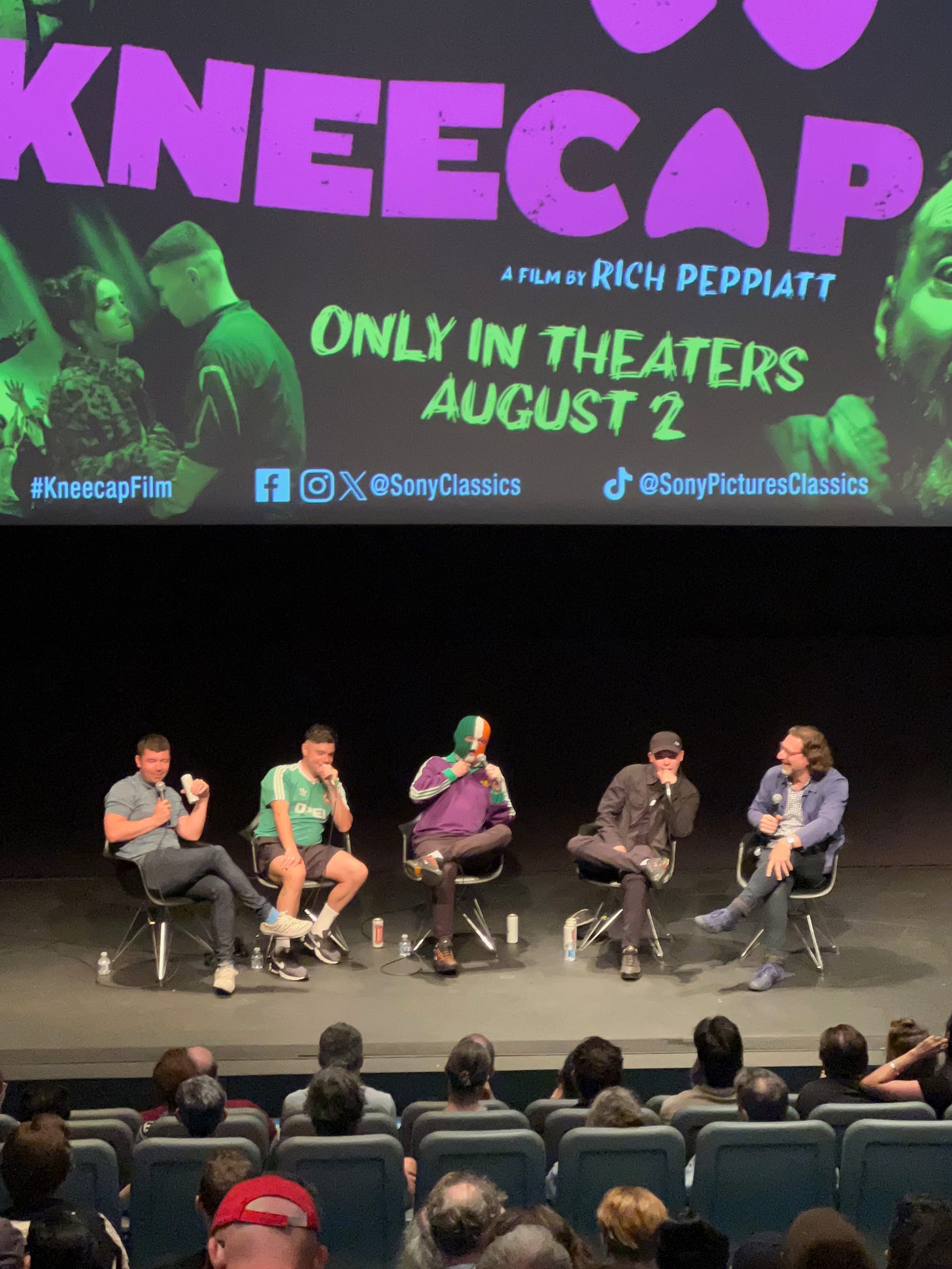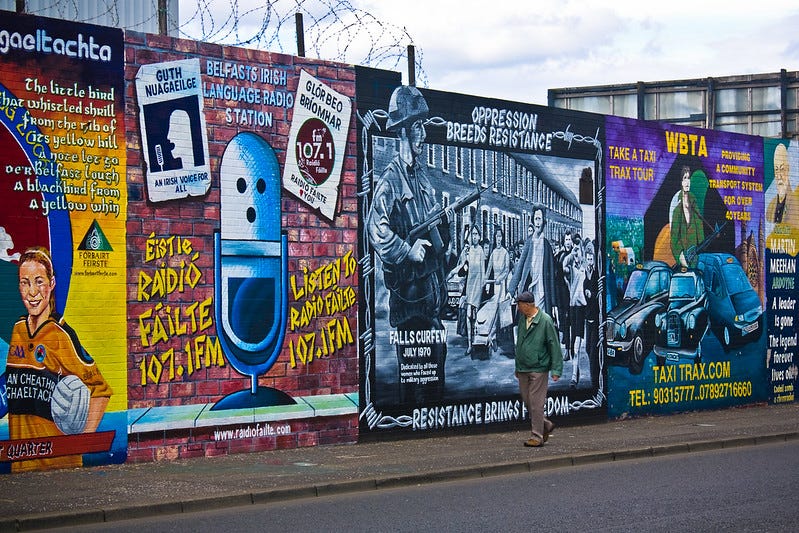I’m a H - Double O - D. Low life scum, that’s what they say about me
‘Cause I’m a H - Double O - D. Low life scum, that’s what they say about me1
When seeing a new movie, I usually avoid trailers and reading up on it – I am quick to suss out whether a film interests me and want to be surprised as much as possible. That rule just proved its worth yet again. When I got an email from the Museum of the Moving Image about a free screening of the film Kneecap, I jumped at the chance; you never say no to a free ticket.
Going in knowing nothing except the film won the NEXT Audience Award at Sundance, I was unprepared for such a relentless, in-your-face film—and the music is even more so. It’s been over five years since I stopped following and listening to rap after being converted from an avid classic rock fan in 2005, so I had no idea about Kneecap, a rap group from the north of Ireland. West Belfast, more specifically.
Kneecap rose to prominence in the late aughts for their uncompromising lyrics, drug use, dedication to social justice, as well as principled anti-colonial and anti-imperialism.2 But more important and controversial was that they were mostly written in Irish, which apparently hadn’t been done before. I was shocked to hear that. I remember the discourse in Iceland vividly just after the new millennium when the rap group XXX Rottweiler Hundar broke the mold in Icelandic rap by rapping in Icelandic.
Kneecap, now Ireland’s submission for the next Oscars, is a fictionalized account of the band’s origins, starring the band members. Like they said at the Q&A following the screening, who better understands the characters than them? The line between fact and fiction is blurred, but the story is close to the truth. It is very interesting to see a biopic of a band that is just getting started, a biopic that doesn’t follow the dull template of most others in that genre. Nevertheless, I still maintain that Walk Hard: The Dewey Cox Story should have been the end of the musical biopic; it totally eviscerated the whole genre. The beats are always the same. Get new material!
From the first scene, a Catholic christening in the woods interrupted by a helicopter from the British occupation forces, to the last, it is an unrelenting and uncompromising story of two young men and one slightly older, finding their voice told with great humor and visual intensity very much in line with the group’s style and ethos. It is definitely a fresh spin on a stale genre.

Best friends Mo Chara and Móglaí Bap are self-described Ceasefire babies, born after the Good Friday Peace Agreement, which marked the end of The Troubles. They, therefore, don’t have any experience with the violence inflicted on the north of Ireland by the British occupation and campaign of terror against Catholic Republicans. Disconnected from their heritage, they are just a couple of low-life scumbags, selling drugs and getting fucked up every day, it seems.
Fate brought them together with the third group member, a music teacher tired of his mundane existence. A person is someone you’d imagine mixing with Mo and Móglaí like oil with water. Yet, with the addition of DJ Próvaí, Kneecap comes together like Voltron, a formidable musical force.
What connects the two friends with their heritage is the Irish language, once banned by the British oppressors. Móglaí Bap’s father is a hardcore Republican who makes a point of teaching his son and best friend the language. The father, played by Michael Fassbinder, views the language as a weapon, saying that every word spoken in Irish is a bullet fired against imperialism or something to that effect.3 The film asks the questions: Who is the language for, and what can be said? Is everything permitted to promote and protect a language?
No, according to the powers that be in Ireland, its northern part, and London, Kneecap had no right to rap about drugs, crime, politics, or anything of real substance. Don’t rock the boat. Just write Taylor Swift-style lyrics without emotional weight, message, or artistic value. Thankfully, members of Kneecap don’t give a single fuck about elite opinion. It is no exaggeration to say that they inspired countless Irish to learn their language, bringing it to a new generation to preserve and make their own.
Make movies shorter!
At an hour and 45 minutes, it's not a long movie per se, but definitely too long. Length is my biggest issue with movies today, and most don’t need to be more than 90 minutes! Kneecap is no exception, with extended slow-mo scenes that feel like running out the clock. If that was an issue, just have more concert footage! It’s a band for chrissakes. The subplot of Mo’s relationship with his father, while definitely enlightening and something that informs his thinking, just doesn’t really land for me. Fassbinder is an amazing actor (with a terrible agent), but the whole thing just felt perfunctory.
In sum, Kneecap is a highly entertaining, informative, and inspiring film. Director Rich Peppiatt (unfortunately, English, like the band members like to remind him) managed to capture lightning in a bottle. Kneecap’s dedication to social justice and anti-imperialism is laudable, plus it’s always fun to hear people disparage the British empire. Even if you don’t like the music, it gives you a different view of the history of the north of Ireland and is worth seeing for that alone.
From the Kneecap song, H.O.O.D, released in 2019.
The name is a reference to a punishment used by the Irish Republican Army (IRA) during The Troubles, a period of violence in Northern Ireland. The term "kneecap" is slang for shooting or disabling someone's knee, and the group chose the name intentionally because they "talk about things that would get us kneecapped."
https://archive.ph/fVU4m





